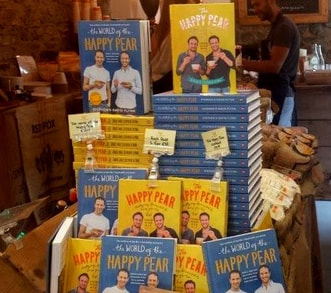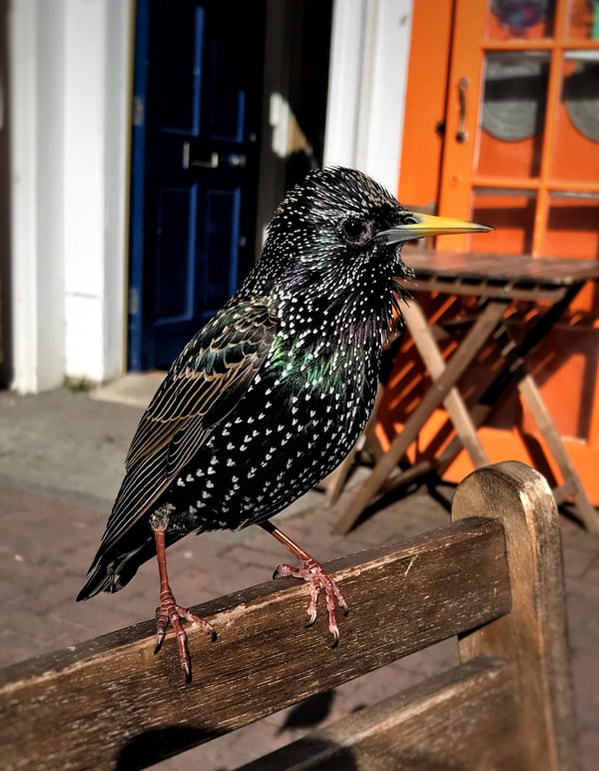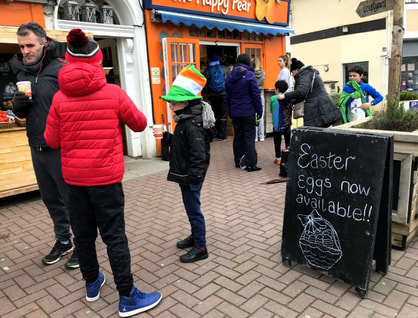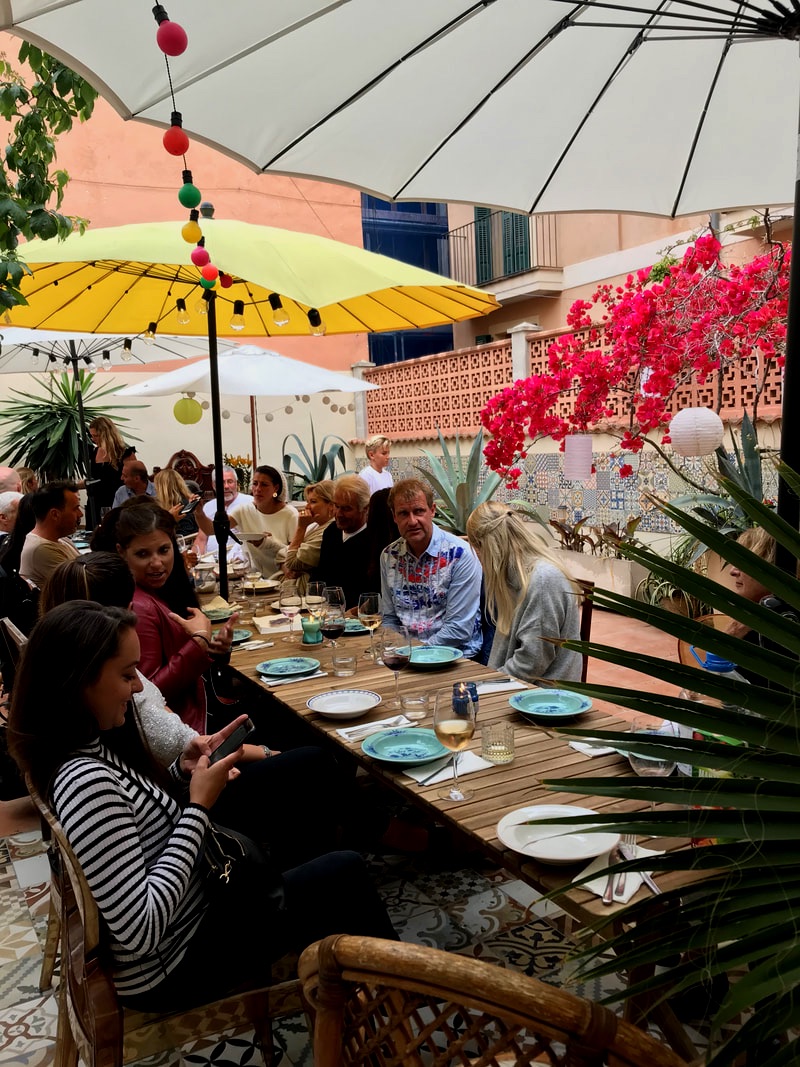|
Some background One of my favourite success stories is the Greystones vegan grocer, The Happy Pear. It's owned and managed by the Flynn twins, Steve and Dave, who have established what is essentially a wholefood empire. They supply the Supervalu chain with readymade veggies and boast an organic deli that serves enormous portions. They have a Youtube channel, the following of a small army, three cookbooks, and rumour has it, a feature in a new Netflix show. I'd have loved the opportunity to intern in the kitchen, but unfortunately left Ireland too soon to be of any use this time around. Look out chaps, I'm coming for you. It got me ticking This business succeeds at what so many small enterprises in my hometown aspire (but fail) to do. Greystones is a blip on the map of an island of moderate population size. As I have repeatedly remarked, everyone buys local and supports local. Non-chain businesses are niche and bound to succeed, because similar gift shops or restaurants diversify to complement one another rather than competing with one another. I assume that The Happy Pear developed within this sort of confidence. With space to dream and play, they established a unique brand intrinsically linked to 'The Hippy Pair' who start the day at 6am with a lengthy swim around the icy Greystones shore followed by an intensive yoga workout. If you want to feel inadequate about your lie-in purely because the ambient temperature was too cold to tolerate, look no further than their daily Instagram story. I was hoping to interview the Flynn brothers on my arrival here, and even encountered them early one morning as they left the deli stocked with hot coffees and toasted breakfast wraps. However, as I was pelting downhill to catch a train, I nearly sent Dave flying to the left and Steve to the right. Deciding to make like Jack Sparrow and seize a more opportune moment, I scarpered on and boarded just in time. But the thinking didn't stop. I landed on an expression in the early hours of a chilly weekday morning that encapsulated what I have been trying to get at: The Village Effect. Sadly, a cursory Google search established that some sassy PhD lady, a certain Dr Pinker, has already had the audacity to coin the term, going so far as to publish a groundbreaking book on the subject. Taking a large mouthful of humble pie, I set out to educate myself, which led me deep into the psycho-sociology of small towns. What is The Village Effect? Forget for a moment small businesses and the thriving charm of low-population living. Pinker outlines the mass of quantitative evidence to suggest that face-to-face interaction impacts longevity. She lays out what we all know instinctively, for example how a child's academic capability is more influenced by the dinner discussion than the nutritional composition of the food on the plate. This effect also impacts adults. Facebook's notorious algorithm updates are optimised to keep us endlessly scrolling and tagging, which doesn't trigger the same response in our neural reward centres. (In fact, one study reports passive scrolling has an active role in diminishing our perceived wellbeing when repeatedly confronted by all those glossy #squadgoals shots). According to Pinker, we don't need to be happy to live to a ripe old age - we just need to talk person-to-person about, well, pretty much anything. She uses the example of the grumpiest and unhealthiest centenarians she has met and studied, and concludes that interaction is a greater contributor to length of life than joy or diet. Her conclusions don't just apply to villages. Any community in which people are able to connect in a face-to-face manner displays the same pattern. Of course, villagers are more likely to support each other simply because there are fewer of them. It is estimated that the average person can only empathise with 150 people - the rest we categorise by stereotypes. This upper boundary is referred to as Dunbar's number, and simply represents the limitation of our brain capacity, rather than an innate human nastiness. People are people the world over
Part of the Happy Pear's appeal is that it really is the local grocer. It grew organically, separate from the infrastructure that supports cleverly-located suburban businesses. Those customers who take the time to visit appreciate its limited floor space and patiently make conversation while they eye out the cake counter. By contrast, life in a city can feel hard-edged. It seems we automatically assume the worst of the millions we share our supermarkets and buses with. Everyone's presumed to be out on the cheap; trying to pull a fast one. We hold our bags between our knees. We keep our wallets out of sight. We swear in the traffic. Somehow we perceive danger (while of course always a possibility) to be pervasive and constant. We adopt a stranger-danger attitude. I remember an odd interaction with a barista who asked me where I was born because I was 'very curious'. I don't think he's used to the excess of half-narratives and questions tossed across the counter in the time it takes to steam milk. Unfortunately verbal diarrhoea is one of my greatest afflictions, more so on a cheerful morning, and it stands out in cities. How different, then, to turn the corner back to my host's cottage in Ireland, having let the kids run on ahead, and be approached by a woman who advised me that my little charge had turned right at the corner. Not only this, but that should he mention a stranger approached him, she had only done so to check that he was alright, and that there was no reason to worry. Perhaps when we are given the benefit of the doubt, we automatically behave better. I don't have data for that one. What I do know is that people the world over do similar things, share largely the same fundamental values, and strive towards comparable goals. Perhaps the difference about a village is that we see more of the same people more often, and so develop trust and connection faster. That isn't so easy when the 'village' tally hits the millions. Talk to people - it's good for your health Dr Pinker has certainly assuaged my guilt for my lapses between WhatsApp responses, though I have realised how easy it is to maroon oneself in a sea of social media. The cliché of the modern age holds true. With all this immediacy, it seems acceptable to put off calling home or avoiding a weekly walk with colleagues. Being as many thousand kilometres from home as I am means that I am more aware of any chance interaction with a stranger. The abundance of these momentary human connections is (to my mind) what makes a village feel cosy. So I'll continue to babble at baristas. It's longevity karma, don't you know.
1 Comment
|






 RSS Feed
RSS Feed
